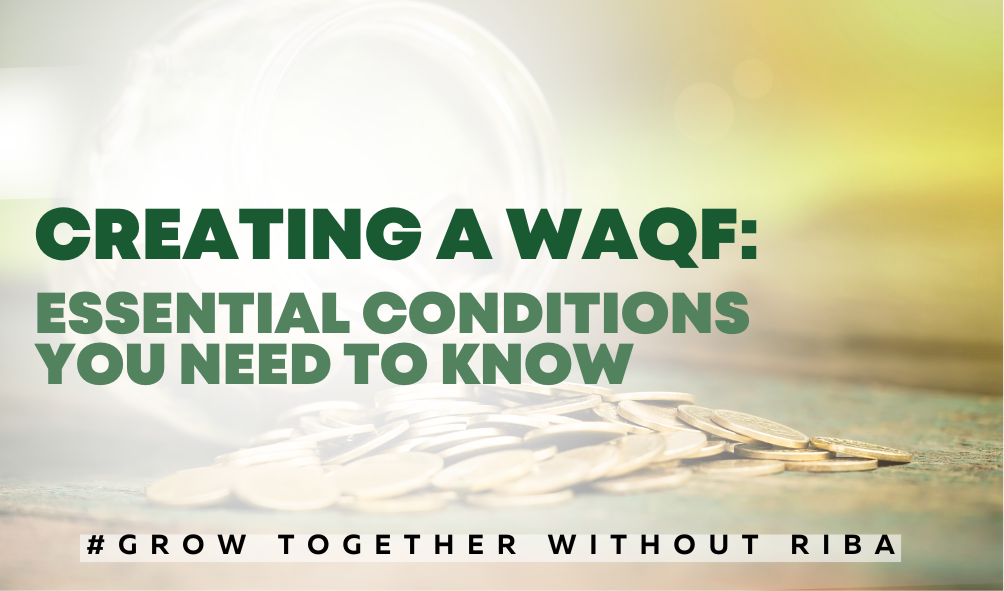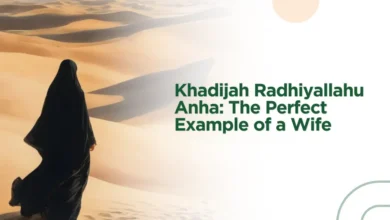Creating a Waqf: Essential Conditions You Need to Know
In Arabic, the terms ‘waqf’ (plural ‘awqaf’) and ‘habs’ (plural ‘ahbas’) are verbal nouns and infinitives. Both words signify ‘to stop, to prevent, to restrain,’ a concept known as ‘al-habs wa al-man.’ However, while the English translation of ‘waqf’ is often understood as a religious endowment, it may not fully capture the depth of devotion and grace associated with the term in Islam.
Waqf entails voluntarily dedicating one’s wealth, whether in cash or assets, in an irreversible manner, to utilize it for projects aligned with Shariah principles. Once a waqf is established, it can never be donated as a gift, inherited, or sold. This is achieved by ensuring that the property cannot be sold or inherited. Therefore, before creating the waqf either immovable or movable need to fulfill the five conditions. You may be wondering, what are the preparations that need to be made before establishing a waqf? Here are the five requirements that must be fulfilled.
Also Read:
Guide to I’tikaf in the Month of Ramadan: Seclusion in Obedience
Akhlaq Lessons from Ramadan Fasting
1. Founder of the Waqf (Waqif)
The waqf is established by a donor, known as the waqif. This can be an individual or an entity dedicating property (waqf assets) to charitable causes like mosques, schools, hospitals, or public services like water fountains. The property becomes an endowment, managed by a trustee (mutawalli) appointed by the founder. The primary motivation for creating a waqf is to seek Allah’s favor and receive continuous blessings until the Day of Judgement. To establish a waqf, the founder must fulfill four conditions:
- Be of legal age (adult).
- Be a free individual with free will (not coerced).
- Possess full mental and physical faculties.
- Be capable of transferring ownership of the property to Allah.
The founder has the right to appoint a mutawalli, either themself or a designated person, to manage the waqf. They can also specify a successor for the trustee in case of death or incapacity.
2. Waqf Asset/Property (Al-Mauquf)
The waqf asset is the property dedicated to generating revenue or utility for the beneficiaries. Here are the key conditions for the waqf asset:
- Owned by the Waqif: The founder must own the property at the time of designation.
- Movable or Immovable: The property can be land, buildings, cash, or other valuable assets.
- Clearly Defined: The property must be clearly identified and described in the waqf deed (written document).
- Lawful (Halal): The asset cannot be derived from unethical investments or businesses like alcohol production.
- Permanent Dedication: The property is dedicated for long-term charitable purposes.
- Good Ends Only: The asset’s use must be exclusively for charitable goals.
The waqf can be created orally with an accompanying action (e.g., building a mosque and inviting people to pray) or documented in a written waqf deed.
Also Read:
The Virtue of Offering Iftar in the Month of Ramadan
Essence Hablumminnallah and Hablumminnas During Ramadhan
3. Trustee/Manager of Waqf (Mutawalli)
The mutawalli is the custodian responsible for managing the waqf asset. This includes maintenance, investment, and distribution of generated income to the beneficiaries as per the founder’s stipulations. Essentially, the mutawalli safeguards the asset, ensures its growth, fulfills the founder’s wishes, leases property when necessary, resolves disputes, collects returns, and distributes them to eligible beneficiaries. Additionally, they should allocate some proceeds and assets as precautionary reserves.
Waqf institutions have a flexible structure, allowing for changes in management to meet evolving societal needs. The trustee must protect the waqf property and maximize its returns. They can hire agents for assistance but cannot give away or lease property without court permission. The appointed individual should be trustworthy and honest. Similar to the founder, the mutawalli must meet specific criteria:
- Be an adult.
- Be a Muslim.
- Possess sound mental faculties.
- Be capable of managing the waqf asset efficiently.
- Demonstrate honesty, trustworthiness, fairness, and loyalty.
Also Read:
Tarawih Prayer and Its Role in Maintaining the Unity of the Ummah
5 Tips Mengontrol Pengeluaran Bulanan Ibu Rumah Tangga
4. Beneficiaries of Waqf (Al-Mawquf Alihim)
The beneficiaries are specified by the founder in the waqf deed. These can be the founder’s family, a specific group (relatives, poor, students), or the general public for services like mosques, schools, or hospitals. The main condition for beneficiaries is to:
- Be existent (currently alive or future generation)
- Be clearly identified
- Not use the waqf for unlawful (haram) purposes
Also Read:
Raih Pemasukan Tambahan dengan Manfaatkan Skill, Emang Bisa?
PELUANG PENGHASILAN: Jual Produk Digital
5. Supervisor (Nazir al-Waqf)
The nazir al-waqf is a supervisory body that regularly oversees the management and condition of the waqf property. They enforce specific punishments if mismanagement is discovered. Like the mutawalli, the nazir appointment has specific requirements:
Be a Muslim adult.
- Be a Muslim adult.
- Possess qualifications and knowledge of Sharia law (similar to a judge).
- Be capable of regularly overseeing waqf property management.
- Be able to make on-the-spot decisions to protect the waqf’s interests.
Waqf offers a unique and enduring approach to charitable giving in Islam. By fulfilling the five key requirements – a capable founder, a dedicated asset, a trustworthy manager, designated beneficiaries, and a vigilant supervisor – waqf structures ensure charitable works continue to flourish for generations to come. This system not only benefits the recipients but also allows the founder to leave a lasting legacy and contribute to a just and compassionate society.
Also Read:
7 Tips Hemat Bertahan di Akhir Bulan
4 Cara Berhemat dan Kelola Keuangan dengan Tepat di 2024
References:
Choudhury, M. A., Pratiwi, A., & Hoque, M. N. (2019). Waqf , perpetual charity , in a general system theory of tawhidi metascience. 1–16. https://doi.org/10.1002/tie.22039
Usman, M., & Rahman, A. A. (2023). Funding higher education through waqf : a lesson from Malaysia. 39(1), 107–125. https://doi.org/10.1108/IJOES-12-2021-0217.
Mohsin, M. I. A., & Muneeza, A. (2020). The institution of waqf: An innovative financial tool for socio-economic development. Kuala Lumpur, Malaysia: Pearson Malaysia.






